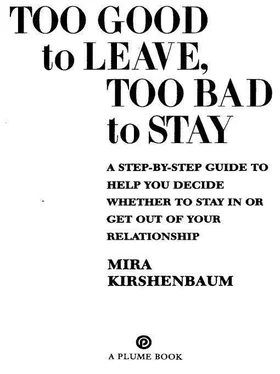Kirshenbaum, Mira - Too Good to Leave, Too Bad to Stay
Здесь есть возможность читать онлайн «Kirshenbaum, Mira - Too Good to Leave, Too Bad to Stay» весь текст электронной книги совершенно бесплатно (целиком полную версию без сокращений). В некоторых случаях можно слушать аудио, скачать через торрент в формате fb2 и присутствует краткое содержание. Жанр: Психология. Описание произведения, (предисловие) а так же отзывы посетителей доступны на портале библиотеки ЛибКат.
- Название:Too Good to Leave, Too Bad to Stay
- Автор:
- Жанр:
- Год:неизвестен
- ISBN:нет данных
- Рейтинг книги:3 / 5. Голосов: 1
-
Избранное:Добавить в избранное
- Отзывы:
-
Ваша оценка:
- 60
- 1
- 2
- 3
- 4
- 5
Too Good to Leave, Too Bad to Stay: краткое содержание, описание и аннотация
Предлагаем к чтению аннотацию, описание, краткое содержание или предисловие (зависит от того, что написал сам автор книги «Too Good to Leave, Too Bad to Stay»). Если вы не нашли необходимую информацию о книге — напишите в комментариях, мы постараемся отыскать её.
Too Good to Leave, Too Bad to Stay — читать онлайн бесплатно полную книгу (весь текст) целиком
Ниже представлен текст книги, разбитый по страницам. Система сохранения места последней прочитанной страницы, позволяет с удобством читать онлайн бесплатно книгу «Too Good to Leave, Too Bad to Stay», без необходимости каждый раз заново искать на чём Вы остановились. Поставьте закладку, и сможете в любой момент перейти на страницу, на которой закончили чтение.
Интервал:
Закладка:
• Practical/dreamy. One always operates on a down-to-earth level; the other is driven by more idealistic or whimsical considerations.
This is, of course, just a partial list. I’ve heard it all, from the couple who was different because one liked to talk when they came home from work and the other liked to be left alone, to the couple who was different because one heard God talking to him and the other didn’t.
Where all this gets confusing, and where I know you’re looking for help, is figuring out where to draw the line when it comes to the issue of difference. Exactly what kinds of differences really do make a difference? How big does the difference have to be to make a real difference? How uncomfortable does it have to make you feel? By the end of this chapter you’ll be able to distinguish between differences that might be merely annoying but don’t really make things bad in themselves and differences that stick a knife right into the heart of a relationship and make it too bad to stay in.
Surprises
When it comes to the impact of differences on relationships, a lot of the things we think are true aren’t.
For one thing, there’s what I call the Darnn/Samantha factor (from the old TV show Bewitched): some huge differences don’t truly make much of a difference after all (except perhaps to a neighbor like Mrs. Kravitz). In the first episode, Darrin discovers that he’s married a real witch. She’s not even a human being! But other than her turning his life upside down every week, they get along fine.
An example of this factor from the real world is relationships between a black person and a white person. While statistically black/white marriages have a higher than average divorce rate, when you exclude people who enter these relationships for the wrong reasons (such as getting back at parents or looking cool to friends), there’s actually a better than average chance of success. So this is truly a difference that doesn’t make much of a difference when it comes to love. And there are many other differences that exemplify the Darrin/Samantha factor.
On the other hand, there’s what I call the city mouse/country mouse factor in which, sometimes, a seemingly small difference of a certain kind ruins everything. After all, the city mouse and the country mouse were both mice—they just liked living in dif ferent places, but that made things impossible.
I worked with a couple like this. They were as perfectly matched as, well, two mice. The only difference was that one really wanted to live in the country and the other really wanted to live in the city. We all kept thinking that this simple difference could easily be worked out, but it proved to be utterly unbridgeable and eventually broke them up.
A Therapist’s Perspective
What is it about some differences that makes people happy they left the relationship and unhappy they stayed? What is it about other differences that makes people say, “I’m so happy I stayed and worked through this difference” or “What an idiot I was to leave when this tiny difference was the only problem between us”?
It’s important that you understand the issue of difference from a therapist’s perspective. It’s a very different perspective than even the one I have in my own relationship when I’m experiencing the differences between my partner and me. It’s like the difference between a doctor’s perspective and someone who’s sick. When you’re sick you think about the germs or viruses that are attacking you. From the doctor’s perspective, as important if not more so is the immune system—the entire set of forces and processes through which your body fights a specific germ or virus—and how she can support or utilize your immune system to fight whatever’s attacking you.
So from my perspective when people come to me with a relationship in trouble, they typically complain about difference, difference, difference, but I see something else: the forces and factors that prevent them from resolving their differences and the ones that could help them resolve their differences.
A Sexual Difference
Here’s an example of a common perspective: A couple comes in complaining about a “huge” difference when it comes to lovemaking. He “never” wants sex. She “always” wants sex. They’re furious, hurt, and in despair. A difference like that can cripple a relationship.
But look at this from my point of view as a therapist. There are a lot of ways this can play out.
Perhaps what seems like a “difference” problem is really a cammunication problem. You’d be surprised how many times I’ve asked polarized couples like this to give a range of how often they’d like to make love in a typical week or month, and the “never wants sex” guy says he’d like to make love once or twice a week and the “always wants sex” gal says she’d like to make love “ideally every day, but I’d be happy if we made love a couple of times a week.” They overlap! They just had never been able to talk in a practical, down-to-earth way about what they were really talking about.
Or perhaps what seems like a “difference” problem is really a negotiation problem. Let’s say the couple had not only been torn apart by how often or not they made love but by who initiated lovemaking. Here’s how one couple worked things out: the person who wanted to make love more often got more lovemaking in exchange for letting go of her desire that her partner initiate lovemaking. This meant that she’d get to make love more often but she’d have to initiate more often. And for many differences there are many possible negotiated settlements that are out of people’s reach only when they have poor negotiating skills.
Or perhaps what seems like a “difference” problem is really a power problem. Let’s say there’ve been power struggles over many things in the relationship for a particular couple, and now there’s a power struggle over “who says” how often they make love. They each want to be the one “who says.” It’s not so much that one wants to win as that he wants the other not to win. All that needs to happen is that the therapist or any other respected figure comes in and establishes a fair, objective rule for how they’ll split the difference. For example, a rule I’ve often established is that they rotate weeks or months, doing it the way one person wants during one time period, the way the other wants during the next time period.
Unbridgeable Differences. We’ve already talked about power and communication in earlier chapters and before long we’ll talk about negotiation. Then we’ll have covered everything that could prevent people from dealing with the differences that inevitably come up whenever two people try to make a life together. These are not the differences that in themselves make a relationship too bad to stay in.
This chapter focuses on what’s left. You’ll find the answer to the question: What makes differences in and of themselves toxic and unbridgeable?
STEP #20: WHO YOU LOVE AND How YOU LIVE
To get at just where a difference makes a real difference you’ve got to focus on what’s really most important to people, to all of us: how we live. If you want to zero in on a difference between you and your partner that all by itself will really make you miserable if you stay in the relationship, answer this question.
Diagnostic question #20. Is there a clearly formulated, passionately held difference between you that has to do with the shape and texture and quality of your life as you actually experience it?
This question gets at the issue of lifestyle. Let’s say one of us likes leading a physically active life and the other does not. That’s a difference. Still, if it’s okay with both of us that I stay home on weekends while you spend those days bicycling out to the country and back, then we actually agree about our lifestyle.
Читать дальшеИнтервал:
Закладка:
Похожие книги на «Too Good to Leave, Too Bad to Stay»
Представляем Вашему вниманию похожие книги на «Too Good to Leave, Too Bad to Stay» списком для выбора. Мы отобрали схожую по названию и смыслу литературу в надежде предоставить читателям больше вариантов отыскать новые, интересные, ещё непрочитанные произведения.
Обсуждение, отзывы о книге «Too Good to Leave, Too Bad to Stay» и просто собственные мнения читателей. Оставьте ваши комментарии, напишите, что Вы думаете о произведении, его смысле или главных героях. Укажите что конкретно понравилось, а что нет, и почему Вы так считаете.












